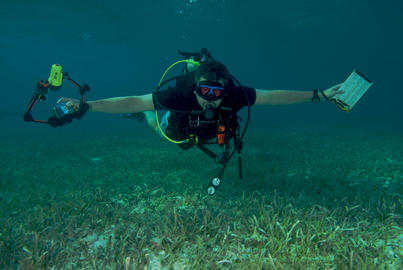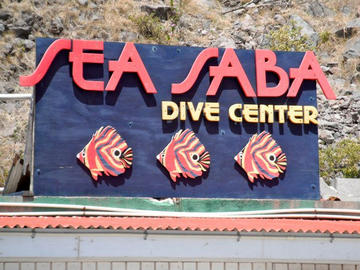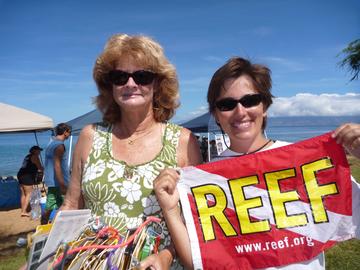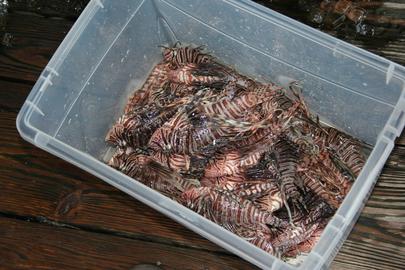Author: Christy Pattengill-Semmens, Ph.D., Director of Science
In addition to maintaining the REEF Survey database and providing data files to scientists, government agencies, and other groups, REEF staff participate in a variety of scientific conferences and workshops each year. Earlier this month, REEF's Director of Science, Dr. Christy Pattengill-Semmens, participated in "Engaging and Learning for Conservation". Christy and 49 others were invited to the workshop to discuss ways to enhance biodiversity conservation and environmental stewardship through public participation in scientific research (PPSR). PPSR encompasses citizen science and other programs where the public is involved in one or more phases of scientific research. With support from the National Science Foundation, the Cornell Laboratory of Ornithology, a leader in bird citizen science programs, initiated this effort to bring together conservation scientists and practitioners, resource managers, academics, educators, and community and project leaders. The overarching goal of the workshop was to discuss best practices to build the field of public participation in scientific research, and lay the groundwork for the workshop team to refine ideas into tools and resources. The two-day workshop was held at an epicenter of biodiversity and conservation research, the American Museum of Natural History in New York City. With almost 20 years of working with REEF, Christy had valuable perspectives on how a citizen science program can meaningfully contribute to conservation and stewardship.
Author: Sasha Medlen, REEF Membership Coordinator
REEF members are at the heart of our grassroots marine conservation programs. Over 43,000 divers, snorkelers, students, and armchair naturalists stand behind our mission.
This month we highlight Jonathan Lavan (REEF member since 2004). Jonathan has conducted 195 REEF surveys in four REEF regions, and he is a member of the Advanced Assessment Team in the Tropical Western Atlantic. Here's what Jonathan had to say about REEF:
When and how did you first volunteer with REEF or become a REEF member? How did you first hear about REEF?
I got certified at age twenty in the cold waters of Maine. I dove there and in Florida for a number of years but then, like so many of us, life got in the way for several years. When I got back into diving I quickly realized that I really knew very little about what I was looking at. I started buying some ID books and eventually stumbled upon the Caribbean Fish ID Guide by Humann and DeLoach. Sometime after that I found the REEF website and saw that REEF had trips. My wife and I signed up for the Bahamas trip in ’04 with Paul Humann and after that I was hooked. I usually go on a couple REEF trips a year and any other trip I go on I always do REEF surveys whenever possible.
If you have been on a REEF Field Survey, where and what was your trip highlight?
Last April I went to Dominica with trip leader Heather George. On one dive I got a little separated from the group (as usual) as I was taking photos. I found a small cave and managed to hunker down to get a good look inside despite all my gear. Tucked way back in the cave I saw something quite small undulating like a piece of ribbon in the wind. It was a Black Brotula! Well I started shaking my rattle like crazy to try and get someone’s attention. Finally, Heather and another diver came over and after much gesturing and changing of places they both, finally saw it. I must say there was nothing more satisfying then when Heather looked around that last corner way back in the cave, saw the elusive fish and then I heard her say clearly through her regulator: “OOOooohh!”
What is your favorite fish or marine invertebrate?
I have many favorites but I have to say that I never get tired of watching or taking pictures of Secretary Blennies. They are so easy to personify with all their goofy expressions and fussy behavior.
Do you have any surveying, fishwatching, or identification tips for REEF members?
As a photographer and surveyor, the key (as many know) is to go as slowly as possible. Let the divemaster race on ahead or make it very clear to them that you are going to be going “SLOOOW”. Not looking under that last ledge could be the difference between a great dive and really great dive.
Author: Alecia Adamson, REEF Field Operations Coordinator
REEF is proud to partner with over 130 dive shops, dive clubs, individuals, and other organizations as REEF Field Stations
This month we feature Sea Saba, a top-notch dive operator located on a small Caribbean island devoid of beaches, but abundant in spectacular dive sites! The island of Saba is known for its unspoiled natural beauty and lack of development- the island has fewer than 2,000 residents. Dive shop owners, Lynn and John, have made scuba diving, travel, and photography their life for well over 2 decades. Some time ago, while exploring a rainforest in Peru with an exceptionally knowledgeable and enthusiastic guide, Lynn realized that there aren’t enough scuba guides in the industry who are highly knowledgeable about the marine life and habitats they work in. To quote her, “Certainly professional and safety standards are important but sadly, far too many dive guides are actually poor guides.”
Working with the REEF program is one great tool utilized by Sea Saba to continue to improve the knowledge base of their dive instructors. Dive staff members are frequently reminded that their core function is to be great guides, and newly hired dive staff are required to become REEF Level 3 surveyors within 60 days! “It’s a win/win/win. We’re making a concerted effort to ensure a great dive experience is had by all our visitors but also by our staff. If we can engage each guide to be more aware and knowledgeable and share this information with our diving guests, dive guides avoid burnout. The enthusiasm is contagious.” says Lynn.
Sea Saba understands and shares REEF’s mission to educate, enlist, and engage divers in marine conservation efforts. In Lynn’s words, “Fish identification skills are a stepping stone in understanding our underwater environment. By sharing knowledge, we not only create better surface interval conversations, we can hope each diver is also an advocate to use what power he/she has to protect this realm: the coral, the fish, the reef, the ocean…our planet.”
Sea Saba hosted the first REEF Field Survey of the year in March and they made sure our trip season got off to a great start - participants confirmed over 150 species sightings during the week, including rare finds such as yellowcheek basslets, punk blennies, and a hammerhead shark! Our team of ten was well taken care of by the excellent divemasters and staff of Sea Saba, many of whom are active surveyors throughout the Saba Marine Park surrounding this petite island. The natural beauty of Saba was the perfect setting for our diving (and hiking) adventure.
Author: REEF Staff
We are pleased to announce the 2012 REEF Field Survey trip schedule. We have an exciting lineup of destinations planned and we hope you will join us. These trips offer a great introduction to fish identification for novice fishwatchers, and are a fun way for experienced surveyors to build their life list while interacting with fellow fishwatchers. REEF staff, board members, and other REEF instructors lead these trips, and each features daily classroom seminars and a full diving schedule. 2012 destinations include: Nevis, San Blas Islands in Panama, Dominica, Sea of Cortez, Hornby Island in British Columbia, Bermuda, the British Virgin Islands, and Cozumel. Dates and details are given below.
To find out more about any of these trips or to book your space, contact our travel consultants at Caradonna at 1-877-295-7333 (REEF), or via e-mail REEF@caradonna.com. Prices listed below are double occupancy; single occupancy are available on some trips. An additional REEF Fee ($200-$300) is added to each package to cover survey materials, seminars, and the trip leader. Airfare is not included in any of the REEF packages. However, Caradonna is happy to price airfare from your preferred departure airport. Please call for quotes.
The schedule and additional information will be posted on the Field Survey Trips page - http://www.reef.org/trips
REEF 2012 Field Survey Trip Schedule
April 21-28, 2012 - Nevis - Oualie Beach Resort. Led by Christy Semmens, REEF Director of Science. Flying in/out of St. Kitts. $1,558 per person, double occupancy, includes all meals, 5 days of 2-tank boat dives, and r/t boat transfer from St. Kitts to Nevis. This will be our first Field Survey to Nevis, an area with very little REEF data. It is also an ideal destination for non-diving companions.
June 9-16, 2012 - San Blas Islands, Panama - Coral Lodge (rescheduled from January), led by Paul Humann, REEF Co-Founder and Renowned Underwater Photographer and Author. Flying in/out of Panama City. $2,417 per person, double occupancy, includes 7 nights accommodation in an over-the-water bungalow, all meals, 5 days of 2-tank boat dives, and r/t airport transfers. Limited to 12 divers.
June 16-23, 201 - San Blas Islands, Panama - Coral Lodge (second week added), led by Paul Humann, REEF Co-Founder and Renowned Underwater Photographer and Author. Flying in/out of Panama City. $2,417 per person, double occupancy, includes 7 nights accommodation in an over-the-water bungalow, all meals, 5 days of 2-tank boat dives, and r/t airport transfers. Limited to 12 divers. Join Paul on one or both weeks of this unique trip for a week in remote islands that are home to the Kuna Indians, beautiful coral reefs, and a great diversity of fishes.
July 14-21, 2012 - Lionfish workshop in Dominica - Dive Dominica and Anchorage Hotel, led by Lad Akins, REEF Director of Special Projects. Team members will conduct surveys and dissect lionfish for research being conducted by REEF and local and international partners. **trip information and cost are still being finalized, details will be posted to the REEF website shortly. Lionfish are just starting to arrive in Dominica and data are needed to establish baselines and determine impacts.
July 29 - August 4, 2012 - San Salvador, Bahamas - Riding Rock Inn and Marina, led by Paul Humann, REEF Co-Founder and Renowned Underwater Photographer and Author. $1,462 per person, double occupancy, includes lodging, all meals, 5 days of 3-tank boat dives plus one night dive, and an island tour of this historic location. This beautiful destination is perfect for beginner fishwatchers as well as REEF experts.
September 22-29, 2012 - Northern Sea of Cortez - Rocio del Mar liveaboard, led by Drs. Brice and Christy Semmens, REEF Scientific Advisors and researchers. Flying in/out of Phoenix, AZ. $2,295 per person, double occupancy, includes on-board accommodations, all meals, snacks and non-alcoholic drinks, and up to 5 dives per day for 5 days. R/T airport transfers by group van is arranged separately. Brice and Christy are returning to Baja Mexico after a wonderful trip aboard the Rocio del Mar in 2010. In addition to great diving, we will be treated to amazing topside scenery, whales and dolphins breaching around us while in transit, and a topnotch crew.
September 26-30, 2012 - Hornby Island, British Columbia - Hornby Island Diving, led by Janna Nichols, REEF Outreach Coordinator.**trip information and cost are still being finalized, details will be posted to the REEF website shortly. Janna will teach you everything you ever wanted to know about Pacific Northwest fishes and invertebrates at this premier cold-water diving destination.
October 20-27, 2012 - Bermuda - Triangle Diving and Grotto Bay Hotel, led by Ned and Anna DeLoach, REEF Board Members and World-Famous Marine Life Authors and Photographer/Videographers. **trip information and cost are still being finalized, details will be posted to the REEF website shortly. Ned and Anna will cover fish identification and behavior, and the group will learn more about the local black grouper spawning aggregation and the Sargasso Sea.
November 10-17, 2012 - British Virgin Islands - Cuan Law liveaboard, led by Heather George, REEF Expert Instructor. Flying in/out of Tortola. $2,200 per person, double occupancy, includes six nights of accommodations, all meals and non-alcoholic drinks, unlimited use of kayaks and other water toys, and five days of diving. The Cuan Law is a unique 105ft long, 50ft wide tri-maran that offers a wonderful itinerary of diving through the BVI.
December 1-8, 2012 - Cozumel - Aqua Safari.**trip information and cost are still being finalized, details will be posted to the REEF website shortly. This annual REEF Trip is always a favorite.
Author: Christy Pattengill-Semmens, Ph.D., Director of Science
REEF proudly awards our 2010 Volunteer(s) of the Year award to Donna Brown and Liz Foote. Donna and Liz both live on Maui in Hawaii, where they have been active in REEF since 2001 when we expanded the Fish Survey Project to the Hawaiian Islands. Donna has been a REEF member since 1994 and Liz since 1999. Both are members of the Hawaiian Islands Advanced Assessment Team and collectively have conducted 361 surveys. Donna and Liz were instrumental during the expansion to Hawaii. They provided technical assistance in the development of the survey and training materials and supported a growing network of local REEF surveyors. Through the years, these volunteers served as incredible ambassadors of the program, generating a core group of dedicated REEFers, who have in turn have carried the REEF torch. The Fish Identification Network (FIN), a local REEF group, grew out of their efforts. 10 years and 10,000 Hawaii surveys later (as of January 2011), REEF is going strong on the islands. Donna and her husband George have also been a part of the South Pacific expansion team, and participated in two REEF training trips to American Samoa. Both Donna and Liz continue to be very active in many other regional marine environmental issues in addition to their REEF activities.
REEF volunteers are the cornerstone of the organization. Without this dedicated corps, our marine conservation programs would not exist. They are central to the REEF Volunteer Survey Project, in which over 14,000 divers and snorkelers have submitted their sightings information to the largest marine life database in the world. REEF volunteers conduct important marine conservation research alongside scientists as part of the Grouper Moon Project and the Lionfish Invasion Program.
The REEF Staff and Board of Trustees extend a big thank you to Liz and Donna and congratulate them on all of their marine conservation efforts and great work on behalf of our organization!
Author: Alecia Adamson, REEF Field Operations Coordinator
Divers will return to Florida Keys waters next month on a mission: net thousands of dollars in cash and prizes while protecting the environment from invasive lionfish. REEF and the Florida Keys National Marine Sanctuary are hosting the second annual lionfish derby series starting May 14, in Long Key, Fla. In 2010, the inaugural series of lionfish derbies removed 664 of the Pacific invaders from sanctuary waters. “Anyone who appreciates the diversity of the Keys coral reef should be concerned about these invasive fish,” said Sean Morton, Sanctuary Superintendent. “Divers have been actively engaged in lionfish removal in the Keys since 2009 and these tournaments are a way to reward them for their dedication to the reef.” Researchers will collect samples from lionfish caught at the derbies to learn more about lionfish genetics, growth, and impacts to native marine life. Each tournament also includes a detailed awareness and training briefing and lionfish tasting. In addition to the derby on May 14, two other events will be held later this year -- August 20 at Coconuts Restaurant in Key Largo and November 5 at Hurricane Hole Marina in Key West. To find out more about the Derby Series, visit the Derby Webpage.









